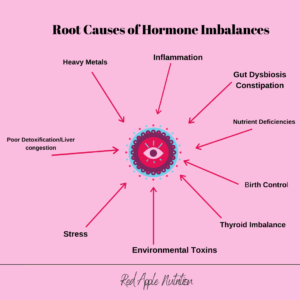We all know the saying that when one woman goes to the bathroom, they all go. Well, guess what? Our hormones also like to travel together. So, when one hormone goes, they typically all go together!
Getting our hormones in check is multi-dimensional and just taking supplements or medications to balance them out is not always the answer. Hormone health must be a holistic approach and we must look at the whole story. Imbalances can manifest in many ways, which is why it is important to see what else is affecting your body and hormone health to ensure you are understanding how all of these things tie together. Your hormones do not just go out of balance for NO reason at all. There may be numerous causes and reasons for hormone imbalance. Let’s first take a look at understanding your hormones.
Hormones 101
Our hormones are responsible for nearly every function in our body. Hormones are secreted from various endocrine glands like our thyroid, pituitary, pineal, pancreas and adrenals. They tell our organs what to do to keep us alive and healthy. There are more than 50 hormones circulating throughout our body at any given moment. When hormones are balanced and working together, we don’t notice them. BUT, when they are not balanced, oh boy, do we notice them! These interruptions and imbalances stem from a wide variety of issues, which cause you to either make too much or too little of hormones. To better understand, let’s break it down into a few groups. There are plenty more hormones, but here is a snapshot of some important hormones that can contribute to our overall hormonal health.
Steroid Hormones—These hormones are lipids that are made from cholesterol which is one main reason why we need cholesterol and fat! Remember how often we tell you NOT to fear the fat, this is one of the many reasons why. You can’t make hormones without it! Examples include:
- Estrogen is an important female sex hormone. Estrogen regulates the growth, development and physiology of the human reproductive system. It affects nearly every tissue in a women’s body and is important for mood, bone health and heart health. As women age, levels decrease leading to menopause.
- Progesterone is a sex hormone secreted after ovulation by the ovaries. When progesterone is just right, it helps keep us calm, supports sleep, reduces anxiety, helps to balance estrogen and also has a role in supporting thyroid health.
- Testosterone is another sex hormone both men and women produce, although levels are higher in men. Testosterone is important for our bones, mood, energy and brain health. Just like any other hormone, when we have too much, this could become problematic and increase acne, oily skin, loss of hair and in women can lead to increased hair growth on the face.
- Cortisol is produced by the adrenals typically during times of stress. Too much cortisol can be due to high estrogen, low Progesterone, neurotransmitter issues, thyroid issues, poor sleep, blood sugar dysregulation and nutrient deficiency. When elevated, your brain may feel like it is on overdrive and you get that “wired and tired” feeling. When cortisol levels are too low, it can lead to chronic fatigue and a weakened immune system. When cortisol levels are in balance, it can help control blood sugar levels, regulate metabolism, help reduce inflammation, support our immune system and help assist with memory.
- DHEA, also produced by the adrenals, brain, ovaries and testes. It is the precursor for the major sex hormones estrogen, progesterone and testosterone and is considered the anti-aging hormone. It helps to enhance memory, boost mood, diminishes wrinkles and supports a healthy libido. When low, we might experience fatigue, low sex drive, a lack of focus and increased body fat.
Non-Steroid Hormones—These hormones are derived from proteins and amino acids. So, getting adequate protein is also important to ensure that we are able to make these hormones. Some examples might include:
- Thyroid hormones are very sensitive to even the smallest disruptions and can affect how we feel every day. Our thyroid is a butterfly shaped gland, positioned in the lower front of the neck below thyroid cartilage. Nutritional deficiencies, medications, toxic burden and infections can throw these hormones off. When your thyroid is off, you might feel fatigued and have dry skin, brain fog or hair loss.
- Insulin is secreted by the pancreas to help get glucose (sugar) into the cells for energy. Consistently elevated levels of insulin, triggered by stress, diet and adrenal burnout can increase risk of insulin resistance, diabetes and can lead to higher levels of estrogen.
- Leptin is a hormone that regulates your hunger. It tells us when to stop eating. Leptin is produced by our fat cells and the more fat cells we have, the higher our leptin levels will be. This might sound like a good thing, except, our cells can become leptin resistant, meaning our brain does not get the proper message to stop eating.
Your hormones are constantly communicating and they are pretty sensitive, which is why it is important to understand what might lead to hormonal balances. Being aware of how your lifestyle and exposure to certain triggers might influence your hormonal health, is important to keep your hormones in check.
Getting your Hormones in Check
Gut health is key! Are you constipated? Bloated? Perhaps it is time to dig deeper to see what is happening in your gut. Pathogens, parasites, bacteria and overgrowth of yeast could be contributing to hormone imbalances. Without properly eliminating, we may run the risk of recycling toxins back into our body, especially estrogen. Although estrogen is incredibly important and beneficial, it is all about balance. Too little estrogen may contribute to symptoms of depression, hot flashes and weight gain, while too much estrogen can cause heavy painful periods, cysts on ovaries and increase risk of cancer due to improper removal of estrogen. In addition, a properly running gut is crucial for thyroid function, considering 20% of thyroid function depends on a sufficient supply of healthy gut bacteria. Low thyroid function can lead to slow transit time, which leads to constipation, increased inflammation, malabsorption and yep, you guessed it, impaired hormone clearance!
Heavy Metals and Environmental Toxins: There are so many ways we get exposed to heavy metals and environmental toxins. And unfortunately, there is nothing we can do to 100% avoid toxins. But, we can drink filtered water, use safer skincare and makeup (like Beautycounter !), find a non-aluminum, paraben and phthalate free based deodorant such as Schmidt’s, Tom’s, Native or Beautycounter and swap household products for safer options like Seventh Generation, Norwex, Branch Basics or Method Products. And of course, last but not least, EAT CLEAN! Choose more organic and locally farmed produce. Avoid pesticides, herbicides and animals that have been fed hormones and antibiotics. Heavy metals like mercury, cadmium and lead can inhibit the production of thyroid hormones as well as other hormones. Endocrine disruptors in plastics and self care items can either mimic or interfere with hormonal functions in our body that have the potential to cause reproductive damage and cancer. Avoid BPA, PFOA (teflon), parabens and Phthalates. For more information, read our previous post on Limiting Your Exposure to Environmental Toxins.
Reduce Stress: stress can interfere with hormones. When we are stressed, our adrenal glands secrete cortisol. While our bodies are well equipped for acute stress, it is chronic everyday stressors that causes the most damage. When the stress response is consistently activated, cortisol raises blood sugar and the longer we don’t manage that stressor, the more consistently our blood sugar will be elevated. Additionally, elevated cortisol interferes with our thyroid function by preventing the conversion of T4 to T3. Keep in mind, however, that stressors do not only have to be from life, what’s happening inside the body in response to toxins, inflammation, heavy metals and gut dysbiosis are all stressors on the body and need to be addressed. However, getting adequate sleep, finding ways to practice mindfulness and carving out time for yourself can help reduce stress.

Get a good night’s sleep: I cannot stress enough the importance of your sleep. When you sleep, your body naturally repairs and detoxifies. Sleep will help shift your hormones to a more favorable state that will help with balance and healing! I recommend supporting your sleep by creating a bed time routine and sticking to it! This not only helps you feel refreshed, but it will balance our adrenals. Some tips include:
- Enjoy caffeine before 12 pm
- Create bedtime rituals (favorite book, tea, face mask, bath)
- Avoid alcohol and sugar before bed
- Avoid stimulatory exercise in the evening
- Start winding down 1-2 hours before bedtime: read, relax, journal, meditate
- Keep bedroom cool (60-67 degrees F)
- Consider lavender essential oil ( diffuser, in bath, on pillow)
- Dim household lights with the sunset
- Avoid blue/white light 1-2 hours before bed
- Keep to a regular schedule: Go to bed at the same time and wake up at the same time!
Vitamin and Mineral Deficiencies: Hormones require specific micronutrients to ensure proper metabolism. If you are vitamin or mineral deficient, your body will use what it can in their place including heavy metals. Metals can compete with the absorption sites with minerals, so taking daily vitamins can and will help prevent deficiencies and potential hormone imbalances as specific vitamins and minerals are necessary for hormone secretion. We can help you figure out if you are deficient in micronutrients. Please contact us for more information.
Inflammation: We all experience inflammation and it, like stress, is a healthy process. However, chronic inflammation is not normal and can lead to chronic conditions like constipation, acne, headaches, joint pain and overall malaise. Getting to the root cause of inflammation is key. Testing and working with a professional can help you figure out the root of your condition!
Final Thought…
Healing takes time, persistence and patience. It is just part of the wellness journey! Trust the process.
Contact Us today to start your wellness journey!
Resources: Beyond the Pill, Dr. Jolene Brighten 2019



